I hadn’t thought my reading was especially melancholy lately, but in looking at this list of recent titles I’m seeing a theme of death and loss: from murder to divorce to the loss of a parent or friend, all but one of this month’s fiction reads is laced with sadness, yet almost all were reading successes—I’ve never been one to shy away from sad books, and these titles and my impressions of them reflect that. But my nonfiction reading life has been much more uplifting, with books about embracing life and flourishing. Let’s get to the reviews!
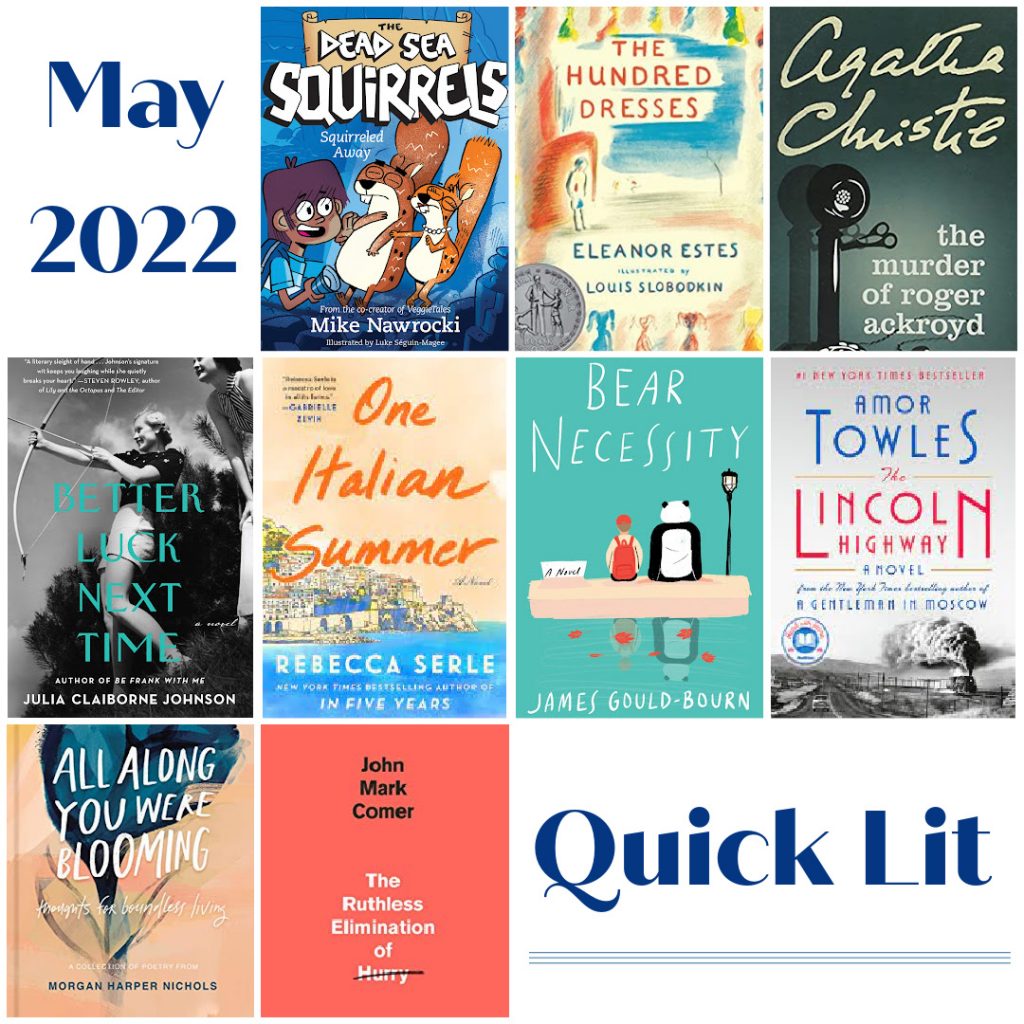
NONFICTION
The Ruthless Elimination of Hurry, by John Mark Comer: I read this for the first time in February of 2020. Like nearly everyone I knew, I had been feeling the pressure of hurry and excess, and this book offered some much-needed solutions. The irony of that timing is not lost on me, but even as our lives were forcibly slowed just after I’d finished the book, I still found the principles relevant and applicable, and many have remained with me (ideas, if not all of the practices) in the two years since.
I rarely reread and wouldn’t have returned to this book, especially not so soon, except that our community group chose to work through the accompanying video study this spring and I thought it would be a good idea to read the book again as a refresher. Wow, am I glad that I did! I hadn’t realized how desperately I needed this message right now.
JMC examines the negative effects we’ve experienced as a result of our reckless hurrying, busyness, unhealthy ambition, and consumerist mentalities. This lifestyle that is the norm in modern western culture (even post-COVID) is antithetical to the way of life modeled by Jesus, and if we are to be His disciples and adapt His modeled way of living we must slow WAY down. Comer doesn’t just identify the problem, he offers practical solutions for embracing Silence and Solitude, Sabbath, Simplicity, and Slowing.
Live No Lies, the book Comer wrote just after this one, was my favorite spiritual book of last year and it was interesting to see the ways these two tie together. Ruthless . . . really is almost a Part One to that book’s deep dive into spiritual warfare, and I am seeing now more than ever how hurry is harming our (my) souls more than almost any other part of present-day life.
I enjoyed working through the ideas of this book alongside my community group members and I think we all came away convicted about how we are getting this area of our life wrong, and empowered to make changes that could have eternal impact.
My Rating: 5 Stars (Bumped up from my previous 4-star rating.) // Book Format: Kindle
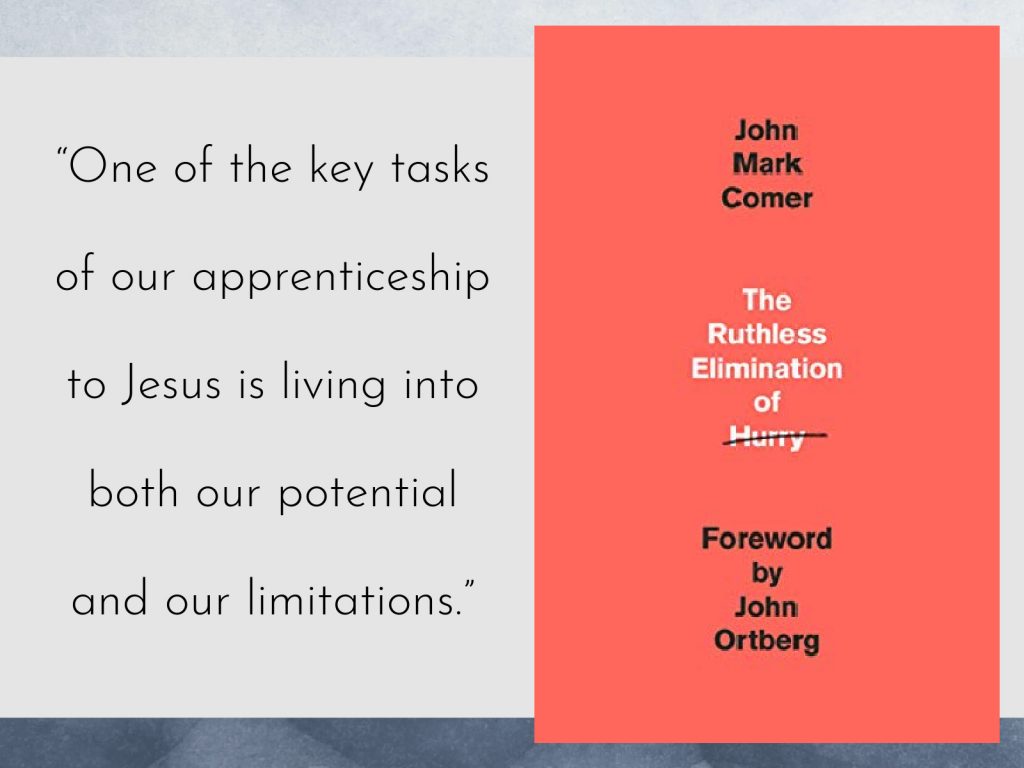
All Along You Were Blooming: Thoughts for Boundless Living, by Morgan Harper Nichols: In this collection of illustrated poems, Instagram darling Morgan Harper Nichols delivers in print form (or, in my case, e-ink) doses of encouragement and inspiration for those seeking to bloom beyond cultural and self-imposed limitations. Within this slim volume are anthems of hope, courage, comfort, and healing that capture the fragility of being human and the God-given boundlessness nestled within each of us, waiting to break free. The poems are specific and personal, as each was written as a response to actual stories and situations from fans and friends.
I don’t read much poetry but almost never regret the times I choose to do so. This book is no exception. The illustrations are lovely (I’m sure I would have appreciated them even more in hardcover) and the uplifting words flooded my soul with encouragement and beauty. The poems themselves are not especially original and read more like a loose compilation of affirmations than true poetry, but the messages are sound (if derivative) and the packaging is truly special. This would make a wonderful high school or college graduation gift.
My Rating: 4 Stars // Book Format: Kindle
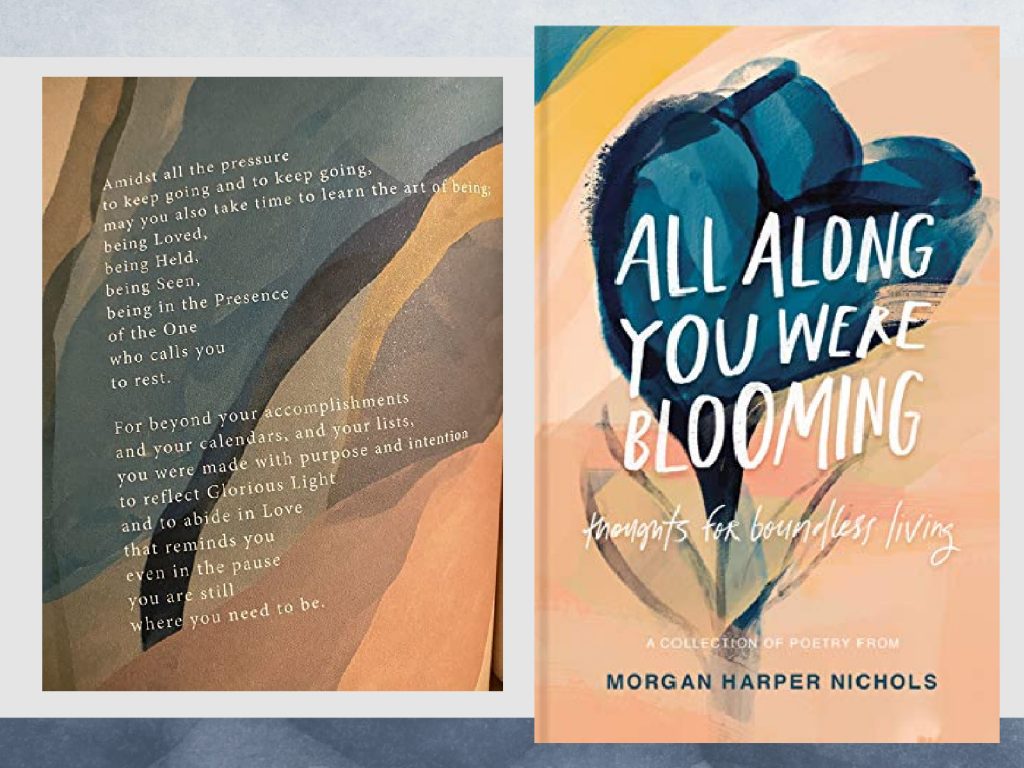
READ-ALOUDS
The Hundred Dresses, by Eleanor Estes: Wanda is a Polish-American girl who excels in school but is regularly teased by the other girls at school for her shabby attire and “strange” last name. Wanda responds to the teasing by telling the girls that she has a hundred dresses at home, all lined up in her closet. The girls—clearly not believing this tale—continue to mock Wanda, who never retaliates but continues insisting that those hundred dresses really do exist. One day Wanda doesn’t show up at school and the students learn, through a letter from Wanda’s father, that they have moved away to avoid the discrimination. The class feels terrible, especially once they discover Wanda’s tales of beautiful dresses might not have been as fanciful as they’d assumed.
This is an interesting story to review: it is very sad but also important (for kids especially, but also for adults). The story itself is very much of its time (it was first published in 1944) which makes aspects of the story feel more quaint than cruel as they actually are; for my seven-year-old, this worked out well because it allowed us to address the harsh themes through a more gentle lens. I hate that the theme of bullying is still relevant today, and though modern bullying looks VERY different, there are still valuable lessons here about treating others with kindness and not discriminating against those who look or act different. The virtues are clearly spelled out, detracting from the art of the story but making the messaging more accessible for young readers.
I have complicated feelings about the mostly happy ending that in ways is quite beautiful but also a little too tidy. Again, keeping in mind that this was written for a young audience, perhaps this ending is best, but it definitely warrants a conversation with young readers about the consequences of cruel actions in the real world. Charleston enjoyed this one because he said “it’s sweet and that’s the kind of book kids like,”—so I don’t know if it had the intended impact even after some discussion.
The whimsical illustrations in this book are melancholy but powerful. This is more chapter than picture book, but the pictures really do enhance the reading experience.
My Rating: 4 Stars // Charleston’s Rating: 4.5 Stars // Book Format: Print
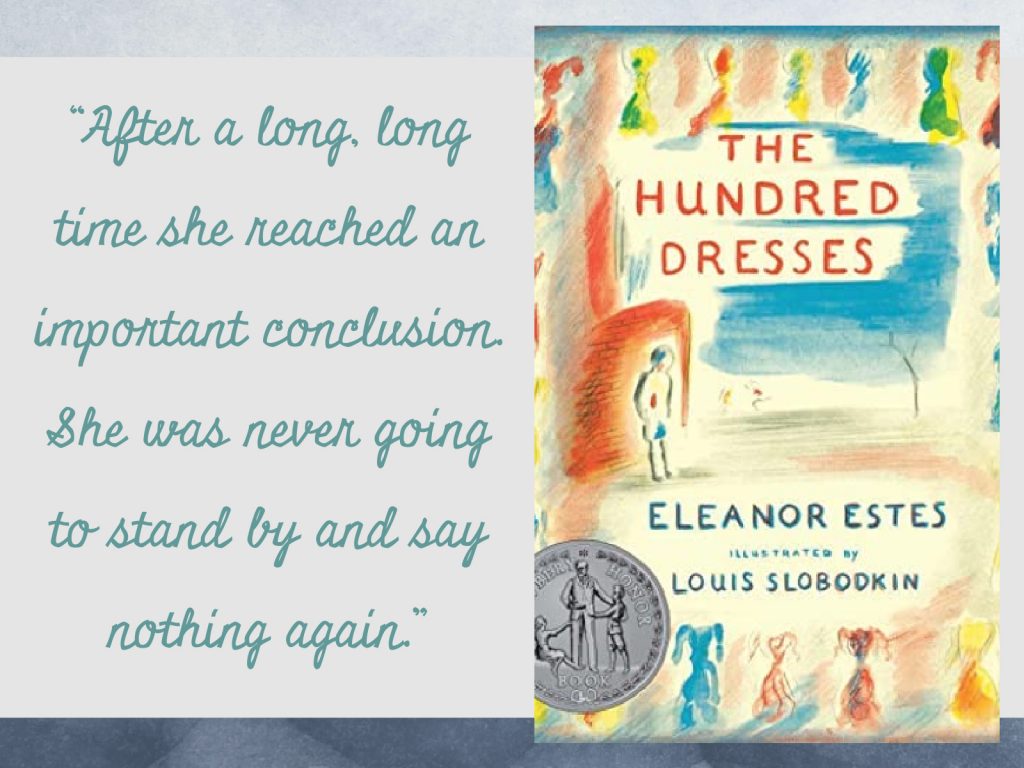
Squirreled Away (Dead Sea Squirrels Book One), by Mike Nawrocki: Charleston has been majorly into graphic novels lately, so the Easter Bunny tucked the first three books of this series into his Easter basket (having ordered them on Amazon and mistaking them for graphic novels—oops). It turns out they are just heavily illustrated chapter books, and since Charleston’s still resistant to reading chapter books on his own, we started this series together.
The cleverly titled books tell the story of 10-year-old Michael, the son of an archaeologist who finds himself lost in the Dead Sea Caves while on a dig with his dad. Michael escapes from the cave, accompanied by two “souvenir” petrified squirrels. Back in the United States, Michael’s little friends awaken after 2,000 years of petrification . . . We’ll have to wait until Book 2 to discover what mischief these resurrected creatures will get into.
This is a very short book without much substance, but we liked the humor and fun illustrations and appreciated the Biblical themes. Each book in the series focuses on a core value (the theme of this one is honoring one’s parents) and though the messages are far from subtle, I liked the inclusion of Scripture and practical application. Even though I wasn’t especially impressed with the quality of the writing, we are eager to see what is ahead in this series.
My Rating: 3.5 Stars (Rounded to 3 stars on Goodreads.) // Charleston’s Rating: 3.5 Stars // Book Format: Print
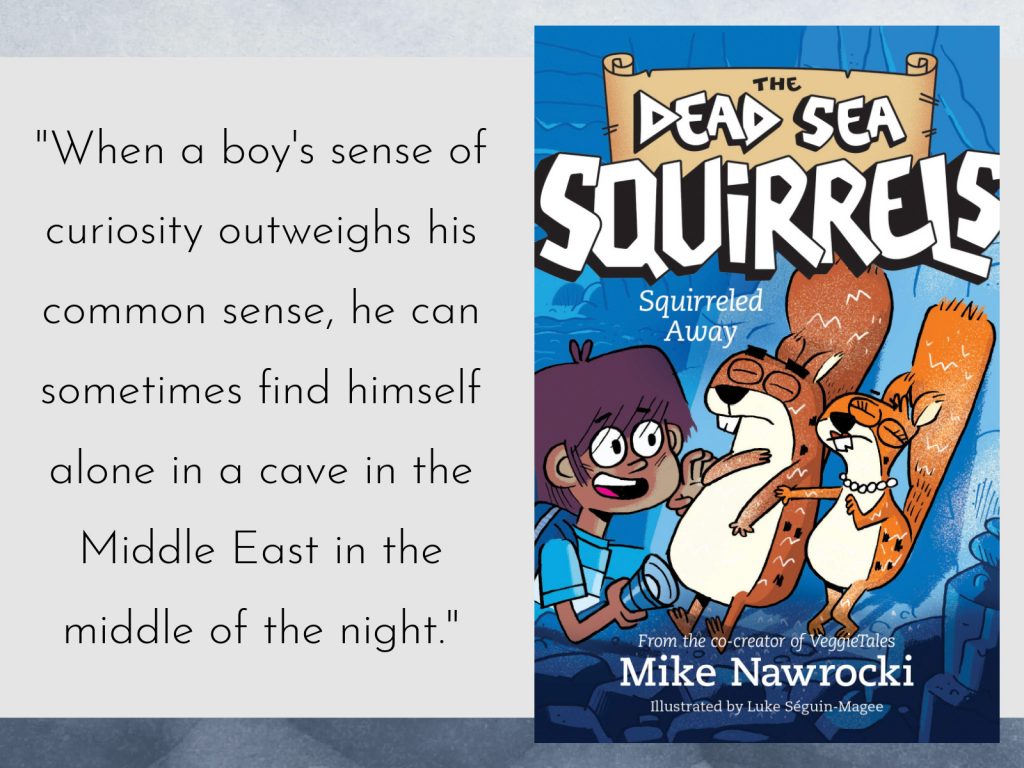
FICTION
Bear Necessity, by James Gould-Bourn: Danny Malooley’s world shattered one year ago when his wife was killed in a tragic accident, leaving Danny to parent their 11-year-old son Will on his own. Will, devastated by the loss of his mother, has not spoken a word since her death and Danny aches to reconnect with his son. To make matters worse, Danny has been fired from his construction job, he’s behind on his rent, and his cruel landlord is threatening bodily harm if Danny doesn’t pay up quickly.
The answer to all of Danny’s woes comes in the surprising form of a panda suit when, after observing the success of street performers in a local park, Danny decides to join them. While performing one day in his tattered panda costume, Danny is approached by Will, who begins to speak for the first time since his mother’s death. Without disclosing his identity, Danny settles into his position as Will’s friend and confidant. But Will still isn’t opening up at home, and Danny’s finances are still a mess; things are looking up, but is it all too little and too late?
I was introduced to this book through the Currently Reading Indie Press List, and I have no idea how the book hasn’t received more attention. I was captivated from the very opening lines (the introductory paragraph is a masterpiece), and the book just got better, evolving into an unexpected, uplifting, and delightfully endearing story that hits that sweet spot of heartwarming, funny, and unpretentiously thoughtful. I adored the dynamic between Danny and Will and was deeply moved by the lengths Danny took to connect with his son; his father’s heart is simply beautiful.
I appreciated the novel’s tone: lighthearted and approachable while still acknowledging the heaviness of its themes. The writing is quick and witty, reminding me a lot of J. K. Rowling’s style in the Harry Potter series. Though the moralizing is a tad overwrought in places, and circumstances within the story are indeed absurd, I had no problem overlooking these flaws for the sake of a beautiful tale, sweetly told. Unfortunately the unnecessary profanity keeps this from being a great story to share with a younger audience, but as an adult reader I found much to love. I did this on audio and the narrator is fantastic!
My Rating: 4.25 Stars // Book Format: Audiobook
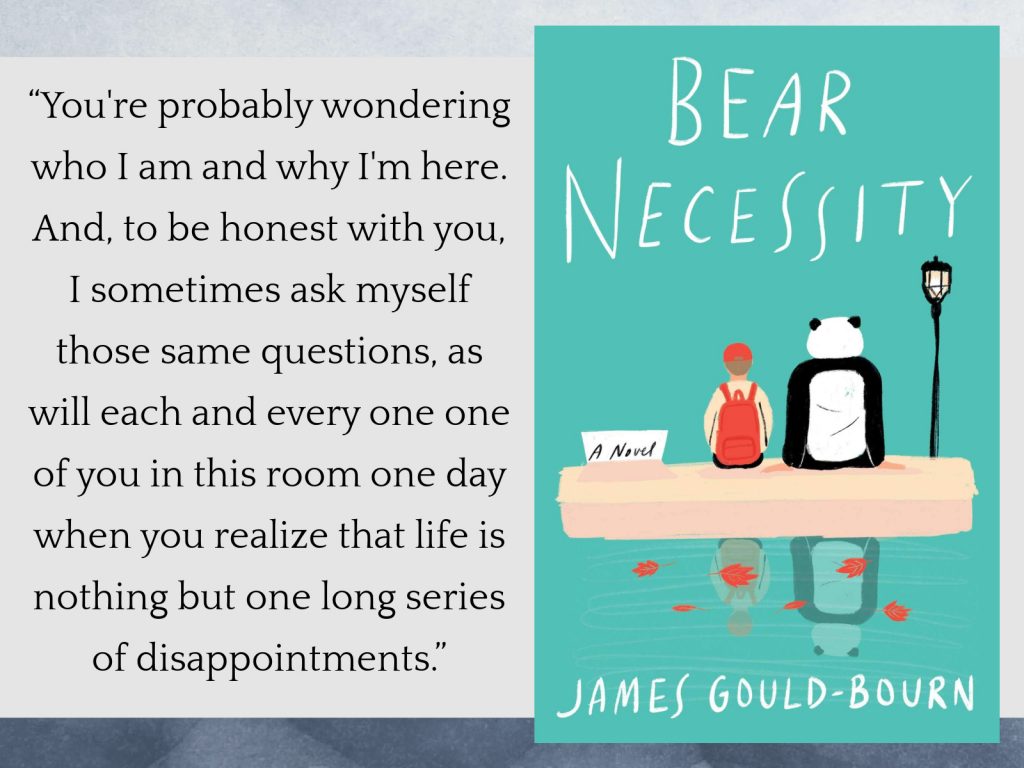
The Murder of Roger Ackroyd, by Agatha Christie: As a longtime Agatha Christie fan, I could hardly contain my excitement when I recently heard Meredith of Currently Reading rave about this classic and I realized it was one I hadn’t read. I’m not sure how this book and I had not crossed paths, particularly because (I have since learned) it is considered one of Christie’s finest, but I was quick to get my hands on it (for free, thanks to Amazon Prime Reading!)
The story, narrated by the town doctor whose neighbor is none other than acclaimed detective Hercule Poirot, begins with the suicide of a local woman who succumbed after having been blackmailed. Upon receiving a mysterious letter revealing the blackmailer’s identity, the woman’s wealthy fiancé (Roger Ackroyd) is found murdered in his locked study. Poirot agrees to emerge from retirement to assist with this intriguing case in which no servant, family member, house guest, or visiting stranger is above suspicion, yet none of the pieces seem to fit.
This book is best entered into with no further information. Steer clear of reviews or commentaries as they will quickly spoil the big reveals. I will say that even entering this one blindly, I was able to spot the murderer fairly early on, but there were still plenty of twists I didn’t see coming and red herrings that had me second-guessing my instincts up until the jaw dropping finale.
Christie earns her reputation as Queen of Crime Fiction with this book: Poirot is at his peek quirkiness and brilliance, navigating the big mystery as well as several smaller ones as only the eccentric detective can. I loved the quaint village setting with its busybody gentlewomen and snooping servants, and the dynamic between our narrator and his sister is a fun one.
I did most of my Christie reading in my teens and didn’t realize at the time how funny her books could be. The dry British humor is subtle but sharp, giving levity to the weightier matters of murder and deception. This novel was published nearly one hundred years ago, and though almost none of the story would be possible in modern times, the keen insights into behavior and motives ring true today.
Within this novel, Christie employs literary tactics that are common in modern mysteries but were absolutely groundbreaking for their time; I see why this is considered one of the most influential titles in the genre. I would have loved to have read this when it was published, before we were all familiar with every crime novel trick and trope under the sun. But even as a seasoned mystery fan, I inhaled this book.
My Rating: 5 Stars // Book Format: Kindle
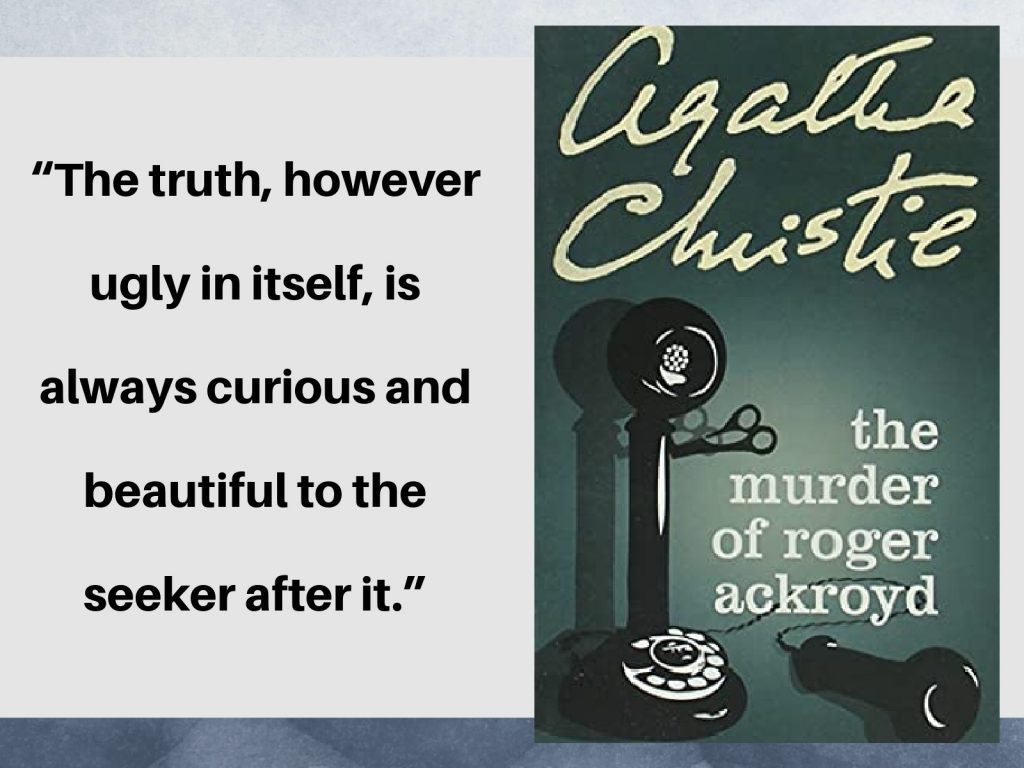
Better Luck Next Time, by Julia Claiborn Johnson: In 1938, wealthy American women seeking quick no-fault divorces flock to Reno, Nevada, known then as the “divorce capital of the world.” In order to satisfy the six-week “Nevada resident” requirement, many of these women make their home at the posh Flying Leap dude ranch. Among those tending to the women’s every whim and need is Ward, a twenty-four-year-old Yale dropout whose family lost everything in the Great Depression. While earning a living at the ranch, Ward’s good looks catch the eye of many of the soon-to-be-single guests.
The story is told in retrospect by Ward, now a retired medical doctor reminiscing about that memorable summer fifty years in the past. Ward shares whimsical stories of the Ranch staff and guests, particularly two memorable women: Nina, a free-spirited, unconventional St. Louis heiress and amateur pilot on her third separation, and Emily, a reserved woman who left her cheating husband in San Francisco but doesn’t know if she has the courage to go through with the divorce. Their summer together was filled with enough “shenanigans to fill your whole book”: an illicit love affair, family secrets, betrayal, and all the best and worst that marriage and separation can bring.
This book is billed as a comedy and though the narration is humorous, I found the story quite sad. There is sweetness woven in, though, and I really liked the redemptive ending. I was also intrigued by the setting: I had no idea that camps like this existed, and the pre-WWII setting felt fresh and fun. The Hollywood references help keep this story relatively light despite difficult subject matter.
The book is largely character-driven and I was intrigued by the quirky characters, especially our endearing narrator—as both the naïve young cowboy, but especially as the wisened septuagenarian pontificating about life, love, and loss. This was great on audio as the story is told in an interview style (it reminded me somewhat of Daisy Jones and the Six in that regard).
I’m glad I learned of this book thanks to the Currently Reading Indie Press List. I really enjoyed the author’s first book (Be Frank With Me) and am surprised I had not heard about this 2021 release before now.
My Rating: 4 Stars // Book Format: Audiobook
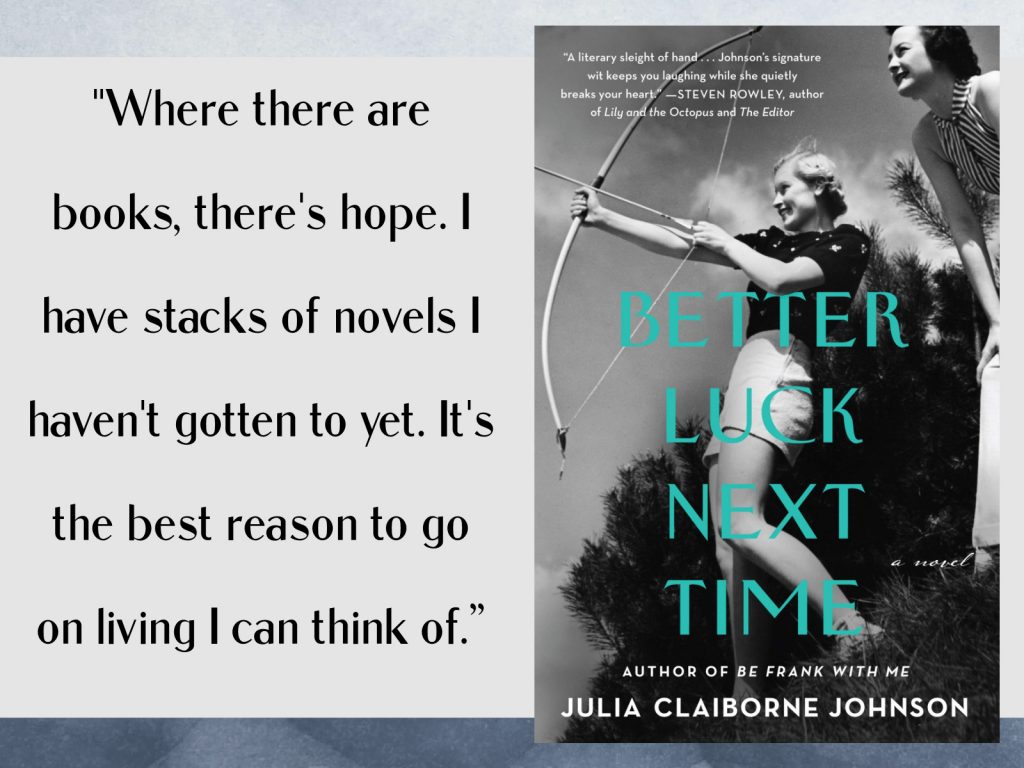
One Italian Summer, by Rebecca Serle: Katy is devastated when her mother dies, leaving a gaping hole that her mother had filled. Carol was Katy’s best friend, her soul mate, her conscience and life manager and solitary source of wisdom, inspiration, and encouragement. Before her death, Katy and Carol had plans to visit the Amalfi Coast, where Carol would show Katy the magical town of Positano where she spent a formative summer before settling down with Katy’s father. Now Katy decides to continue with the trip on her own, leaving her husband at home in America and unsure if she hopes to return to him—because with her mother gone, Katy is second-guessing everything about her own life, including her marriage.
When she arrives in Positano, Katy is immediately smitten with the stunning waters and quaint cliffside town, but it is more than a change of place that has Katy feeling specially tuned to her mother’s spirit—shortly into Katy’s trip, Carol herself appears. Not the older, buttoned up Carol that Katy has always known but Carol at thirty, carefree and seeking answers of her own. Katy doesn’t question the appearance of her mother but takes the opportunity to befriend this woman who is not at all who Katy expected. Katy finds herself struggling to reconcile wayward Carol of the past with the perfect mother she knew and idolized, and in seeking to come to terms with the truth of her mother she must also do some soul searching of her own.
I was immediately drawn to this book’s premise, as I have always wished I could get to know my own parents at different ages (and have wondered what it would be like for my kids to know a younger version of me). As a thought experiment this is insightful and thought-provoking, and though the magical realism involved isn’t quite explained to my satisfaction and contains many layers of impracticality, I was able to set aside my disbelief for the sake of an intriguing story. (As Serle explains in one interview, the magic is present for the sake of expanding the story but is not meant to be a focal point.) Unfortunately the story itself didn’t play out as I would have liked. Katy is not a sympathetic character and I found myself very saddened and frustrated by her choices, particularly her treatment of her husband.
(SPOILER ALERT! SKIP TO THE NEXT PARAGRAPH IF YOU DON’T WANT TO SPOIL SOME KEY ASPECTS OF THE PLOT.) Infidelity is my biggest literary pet peeve, especially when it’s passed off as benign or even celebrated, and that is the case here—something that was NOT okay with me. It isn’t just the novel’s illicit romantic entanglements that bothered me: the dynamic between Katy and Carol is also problematic—deeply enmeshed and dysfunctional, something that is addressed to some extent but remains pretty disturbing. I’m all for a sweet mother/daughter story but this takes that to the next level in some unhealthy ways.
One Italian Summer has a dazzling sense of place and I truly felt transported to the Amalfi coast as I read. But other aspects of the writing leave much to be desired: the sentences are short and choppy and there is a lot more telling than showing. The narration goes down easy but I found myself seeking some substance from what proved to be more of a milkshake book. I enjoy the themes Rebecca Serle explores in her books and the clever interweaving of fantastical elements into mostly straightforward stories, but this particular book was not my favorite of hers.
If you choose to read this one, be sure to hear Serle share more of the novel’s origin story (including its autobiographical elements) in this interview.
My Rating: 3.5 Stars (Rounded down to 3 Stars on Goodreads.) // Book Format: Kindle
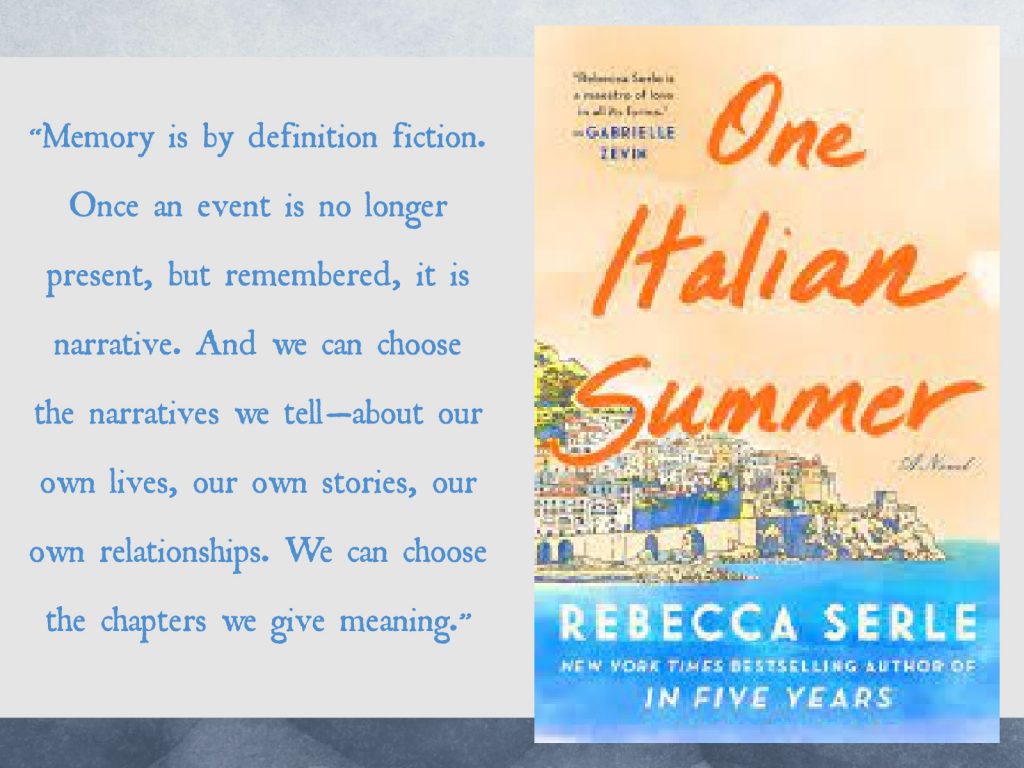
The Lincoln Highway, by Amor Towles: Amor Towles doesn’t just write books, he creates masterpieces: his previous two novels are both on my list of All Time Favorites—beloved to the point where I was nervous to pick this one up for fear it could never live up to its predecessors. But I should have known better than to second guess Towles, who once again has exceeded my expectations.
Although The Lincoln Highway embodies Towles’ distinct style, it is a near opposite from his last book in scope: While Gentleman in Moscow spans generations in a confined space, this novel covers a lot of physical ground over just ten days.The plot here is almost secondary to the masterful writing and brilliantly crafted structure, but I’ll give you the setup: in June of 1954, eighteen-year-old Emmett Watson returns to his family’s Nebraska farm after serving a year at a work camp for involuntary manslaughter. In the year that Emmett was gone, his father passed away, leaving behind a farm that was foreclosed upon by the bank and Billy, Emmett’s precocious eight-year-old brother.
With nothing to keep them in Nebraska, Billy and Emmet make plans to drive to California in search of the mother who abandoned them several years earlier. But before they leave, they make an unexpected discovery: two of Emmett’s friends from the work camp, Duchess and Woolly, had stowed away in the car that returned Emmett home. And the two stowaways are set on persuading the brothers to assist them in an adventure of their own.
Over the next ten days we follow Emmett, Billy, Woolly, and Duchess on their rollicking misadventures along country roads and into the big city, in train cars and stolen vehicles, through brothels and convents and everything in between. We meet a colorful cast of unforgettable characters, some who play nicely into the boys’ stories and others who alter their trajectories in tragic ways. Through each protagonist we gain unique perspectives on adolescence, retribution, forgiveness, second chances, loyalty and more. Every character’s one-of-a-kind experiences (past and present) adds shades of meaning to what it is to be a teenage boy in 1950s America, and really what it means to be a human navigating the messiness and beauty of life.
Towles’ writing is rich with meaning, layering in historical, Biblical, and literary references that are subtle but add inestimable depth to the reading experience. I’m not a rereader but this is a book I would like to return to, as there is so much here to ponder and explore. This is a book that can be read and enjoyed at many levels, offering a fast-paced and entertaining story as well as thoughtful philosophical and literary meditations and character studies throughout. This book had me laughing and crying, gasping in astonishment and shaking my head in disapproval, nodding along with understanding, and ultimately hugging the book (well, my Kindle) to my chest in gratitude for a story that helped me to connect to my own humanity—the good and the bad.
I do have a couple of critiques: Towles uses long dashes in place of quotations marks, which I found distracting (though it was certainly a thought provoking choice). I also HATED aspects of the ending, Even in these frustrations, though, I couldn’t help but admire Towles’ stylistic choices, reaffirming my appreciation for his artistry.
I read this as a Buddy Read with my friend Cara, and with so much to discuss in this book I would highly recommend reading it with a book club or a friend. Our partnered reading absolutely enhanced my understanding and appreciation of the book.
What a brilliant and quintessentially American ode to reading, storytelling, adventure tales, roadtrips, brotherhood, and growing up. I’m happy to add this to my All Time Favorites List, making Amor Towles the most represented author on that list!
My Rating: 5+ Stars! // Book Format: Kindle
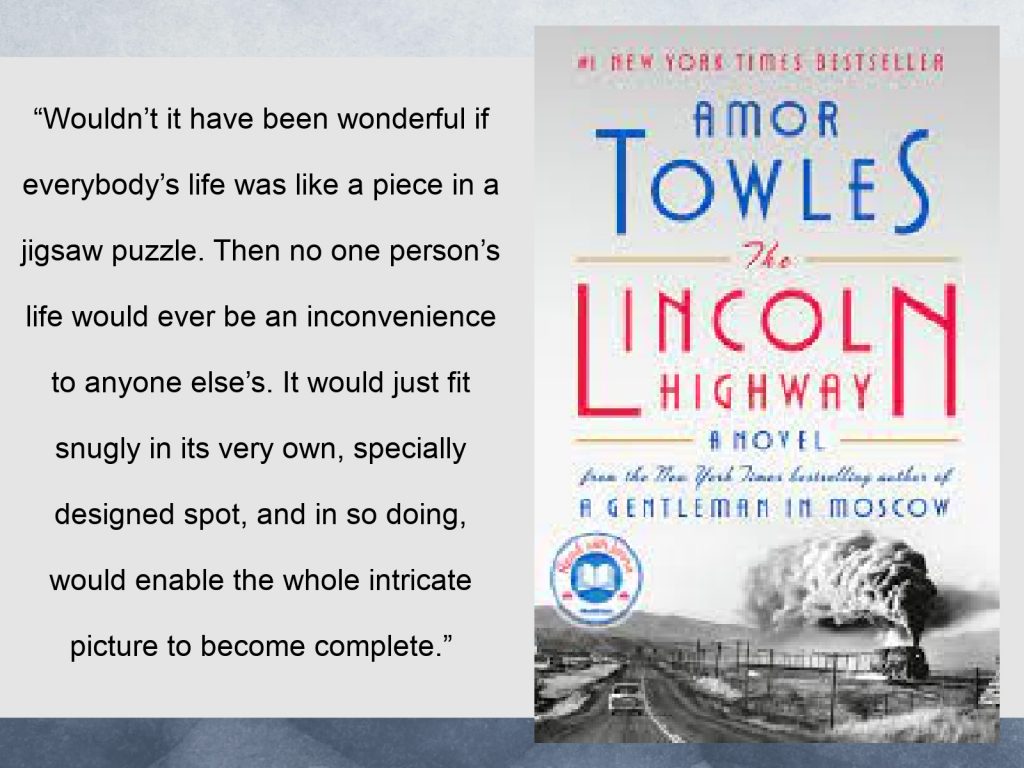
If you’ve read any of these titles, I’m eager to hear your thoughts. I’d also love to know what you have read and enjoyed (or hated!) lately. I welcome any and all recommendations.